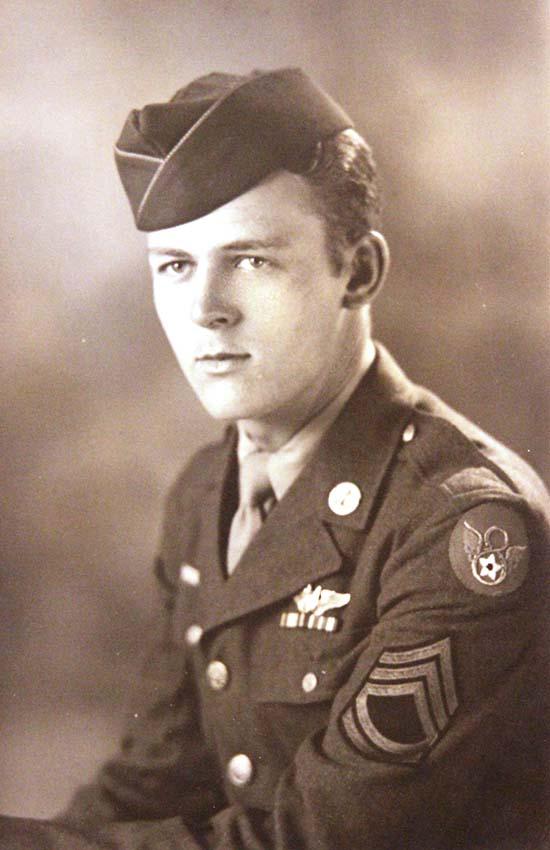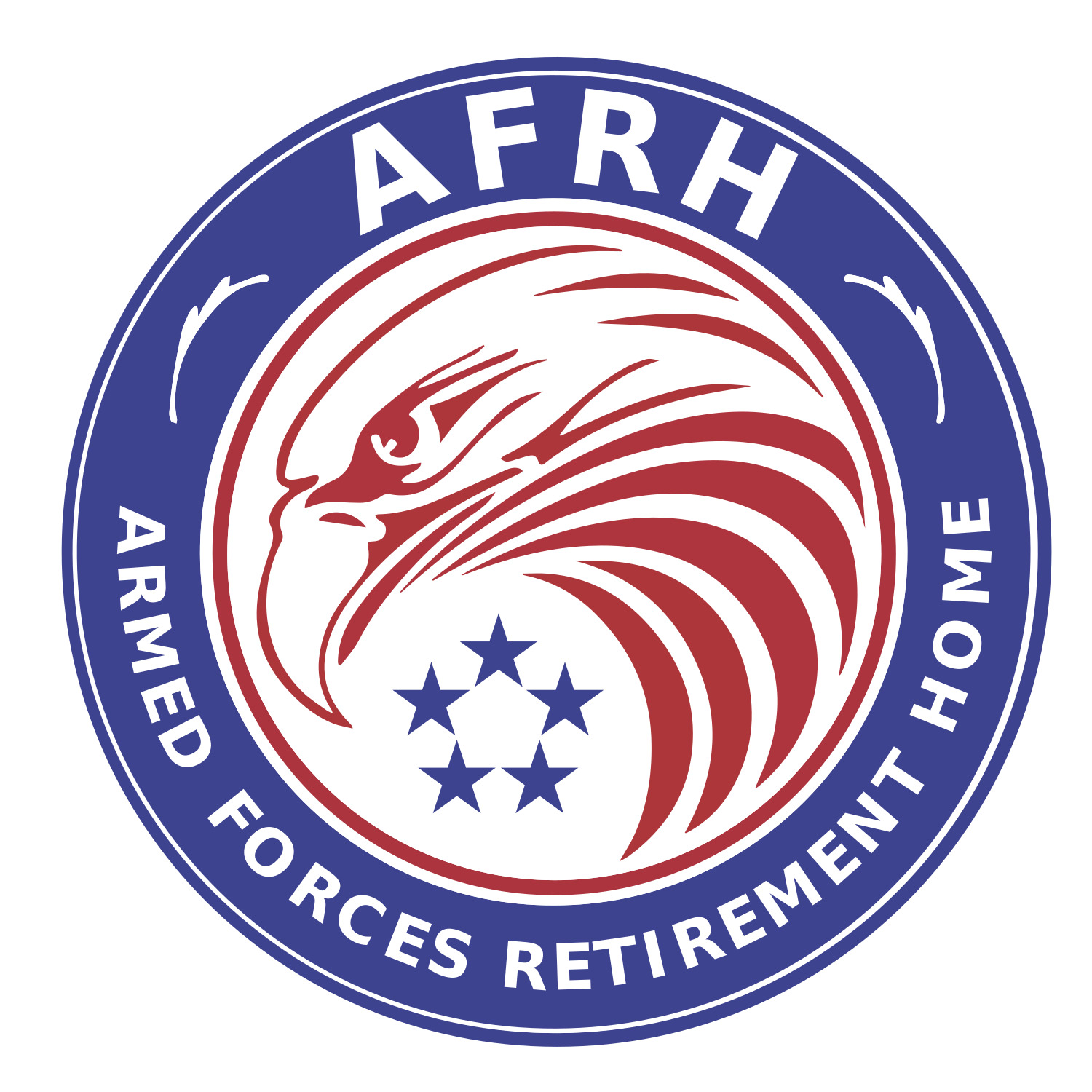
AFRH-G Veteran Highlight – John B. “Jack” Oyster
By Lori Kerns, AFRH-G Librarian
In 1922, Jack Oyster was the last of six children born to the Oyster family. His father was a point man for Maryland Senator Millard Tydings and his mother was a housewife. When Jack was two, he and his family moved from Washington, D.C. to Maryland. Sadly, his father died in 1938 leaving behind a single mom with six children to rear during the Great Depression. To support her family, Jack’s mother became a postmistress in their small town. His older siblings also took jobs to contribute to the family income. Once he was old enough, Jack also began working such jobs as newspaper delivery and golf caddy to provide more income. After graduating high school, he began working for the telephone company until he was drafted in 1943.
In February 1943, Jack entered the Army Air Corps. He was sent to radio school at Scott Field, IL. After finishing, he was assigned as a radio operator to the 34th Bomb Group with the 18th Bomb Squadron. The squadron was sent to different parts of the U.S. for training before they were sent to South America. As a group, they flew across to Africa and then to an 8th Air Force Base in England. Jack and his crew flew 15 missions, 13 in a B-24 and two in a B-17, during WWII. For him, all 15 were memorable but three definitely stand out. The first notable mission was on June 7, 1944. He remembers looking down at one point to see the troops making their way up the cliff in Normandy. His plane, nicknamed the “Mean Kid” flew with a maximum effort that day. The crew was getting back late when a German fighter flew underneath and shot down two other planes in their formation, one on their right wing and one on the left. The planes crashed on their base.
Another harrowing mission occurred on June 14 when “Mean Kid” was shot at again. The crew’s pilot, Sam Laskin, was hit in the leg and hand by flak. The plane began to fall out of control. Jack gave his pilot a couple of shots of morphine and told the copilot to, “sit down and fly the plane.” Once the morphine began to take effect, Laskin was able to urge the copilot to safety. In the meantime, the engineer had found that the hydraulic equipment was not working that kept the bomb bay doors from opening. With a bomb load on the plane, Laskin instructed the engineer to begin releasing the bombs one by one to break the doors open. Finally under the weight of six bombs, the doors gave way for the bombs to fall into the English Channel below. Laskin began urging the crew to bail out because their landing gear was faulty and he knew they would be making a belly landing. However, the crew refused to desert their pilot. Jack, along with two other crew members, stayed right behind the pilot and copilot until they crash landed. The pilot was taken to safety and eventually given the Silver Star for saving the crew.
On September 27, 1944, Jack flew his 15th mission when the plane was shot down. Along with the other crew members, he parachuted out of the plane and landed in a courtyard. He was taken to a local jailhouse until the German military retrieved him and brought him to Frankfurt. Here, he was interrogated for two days and then shipped off to Stalag Luft IV, a POW camp. Jack lived with other POWs in barracks receiving parcels from the Red Cross. In early 1945, the Russians had advanced close to their camp. On February 6, 1945, approximately 8,000 men from the camp were sent on a forced march, later called The Death March, to escape the Red Army. With only what each man could carry, which was very little food and clothing, they were lead throughout the bitter German winter. When they were lucky, they would sleep at night in a barn or makeshift shelter. Other nights were spent in the unforgiving elements. They endured these harsh conditions for almost 600 miles until April 26, 1945 when they were marched right into American lines. After a couple of weeks, Jack was able to sail home. He remembers how great it was to see “Lady Liberty” when he arrived at New York Harbor on June 15. Jack humbly gives thanks to those that stayed on the Homefront for keeping the nation running. He said they did not get enough credit.
While Jack was off at war, he had been engaged to Helen Elizabeth Rhodes. He had refused to marry her until he knew he was safe at home. So within two weeks of his safe return, the couple married. He was honorably discharged in October as a tech sergeant. For his efforts in the war, he was given the Air Medal and three oak leaf clusters.
Jack decided to take advantage of the GI Bill and enrolled at Georgetown University. Within two and a half years, he earned a degree in executive business administration. He worked a couple of jobs to support his new family of two children, Steven and Janelle, until he landed a salesman position with SoundScriber Corp. Before too long, he worked his way to having his own branch in Cleveland until he was given the whole Midwest. Jack soon began to miss being away from his family and decided to begin his own business, Electro Systems, Inc. His new business provided sophisticated audio/visual programs and equipment for any type of training situation. He successfully ran his business for years until he became leery that computers were beginning to perform many of the same functions that his training equipment offered. At age 70, Jack decided retired. He and Helen sold their house and moved to Florida in 1992.
He began enjoying his retirement by playing golf, being an active Kiwanis member, and volunteering with the local sheriff’s department. Living in the Florida panhandle, he realized that there was not a VA clinic in the area. This began his pursuit to have a VA clinic created at Eglin Air Force Base. He was finally successful and in 1996 the clinic was completed. In appreciation, he began volunteering at the clinic where he served over 3,000 hours. Around 2009 Helen became ill. After two years of fighting her illness, she sadly passed away. The couple, proud grandparents of eight grandchildren and nine great grandchildren, was about to celebrate their 66th wedding anniversary.
Jack remembered a fellow VA volunteer speaking highly of AFRH-G. After looking into the facility, he decided it was the best place for him. He likens life at the home to being on a cruise. He says that he enjoys the diversity of the residents. He also takes advantage of the many trips offered and enjoys listening to books on his Talking Books equipment. Jack, with his humble and charming disposition, is such a treasure for AFRH-G to have among its many great residents.
- Log in to post comments
